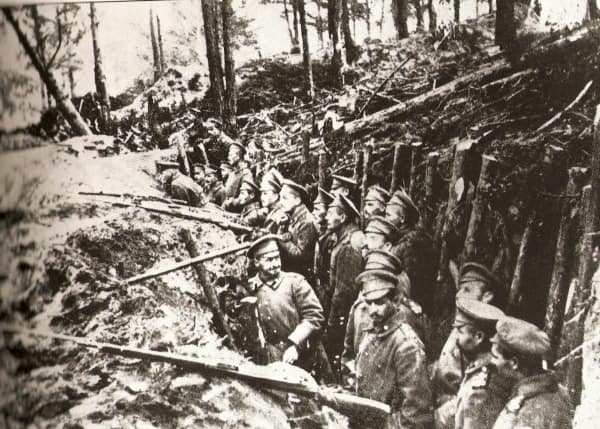The Russian Revolution dramatically changed Russia from an autocracy to a communist system of government. The Revolution started during World War I, and eventually the Soviet Union was formed. The Russian Revolution was, while a huge economic, social, and political change, the result of a number of different factors that built up over time, including economic, military, and political circumstances.

ADVERTISEMENT - CONTINUE READING BELOW
Military Defeat in World War I
Russia entered World War I relatively underdeveloped. While the country had taken significant steps forward in the 20 years prior to the war, it was distinctly less industrialized than its allies. Russia’s navy had been decimated during a conflict with Japan in 1904 and 1905, as well as internal strife.
When World War I began in 1914, Tsar Nicholas II was surprisingly unprepared for the conflict. He knew his cousin, Kaiser Wilhelm, relatively well, and while he knew he was power-hungry, he did not expect all of Europe to erupt into war. Nicholas’ poor leadership led to significant wartime failures in Russia. First, he appointed his inexperienced cousin as commander-in-chief of the army, then he planned an invasion of East Prussia. Germany was expected to be largely involved in the invasion of France, as described in the Schlieffen Plan. The theory was, functionally, a good one; however, the leadership and implementation of the plan was poor. In August 1914, Russia suffered a massive defeat at the Battle of Tannenberg. In total, some 150,000 troops were lost in this single battle. Additional defeats followed.
In September 1915, Nicholas took command of the army himself. This decision would prove fatal during the Revolution. Earlier in the war, Nicholas’ distance from the front had provided him some protection. He was physically distant from the front lines of World War I. When he took command and went to the front, he lost that buffer zone of sorts, and bore a much more personal responsibility for the events that unfolded during World War I. Nicholas left his wife, the Tsarina Alexandra, to govern. She was not well liked, and was German by birth.
By the end of 1916, Russia’s already limited resources were severely depleted by the war. Food, goods, and other essentials were scarce in Russian cities. Strikes and protests began in late 1916; however, the Tsarina failed to respond appropriately. She blamed the rebellions and strikes on undesirables, and failed to address the concerns of the people. When Nicholas attempted to return to Petrograd, he was faced with railway strikes, and was greeted by members of the military and Duma, Russia’s national parliament. He was forced to abdicate.
A provisional government replaced the autocratic government of the Tsar; however, the government did not immediately withdraw from the war. Food and fuel shortages continued throughout much of Russia. As military defeats continued, along with long lists of the war dead, negative feelings about the provisional government grew, paving the way for the Revolution.

